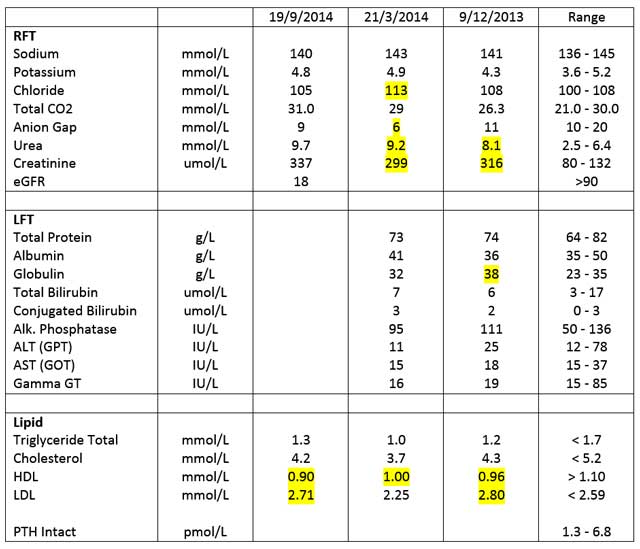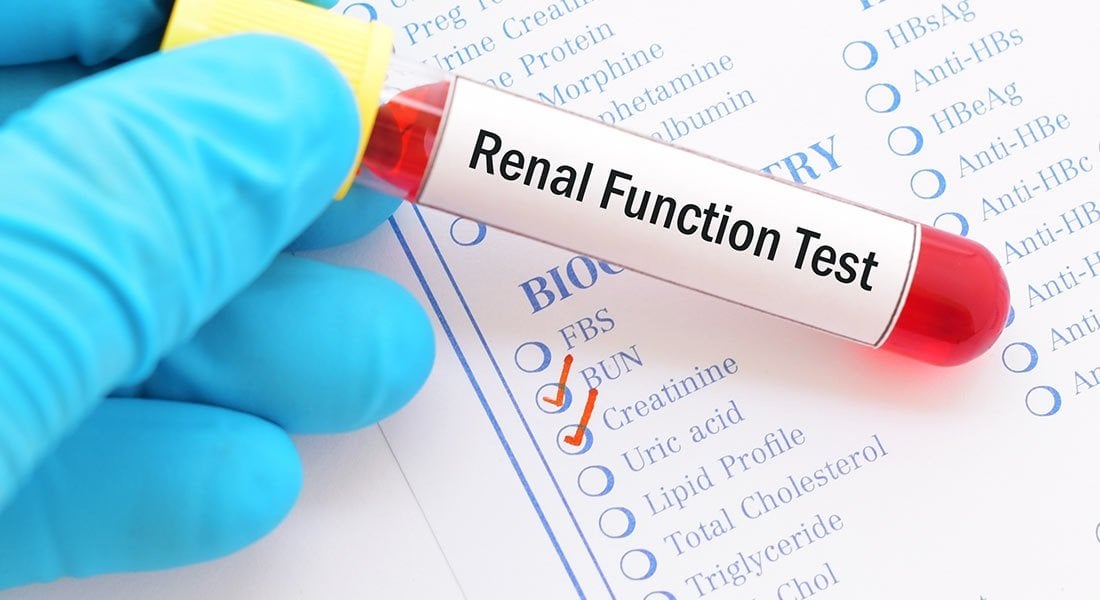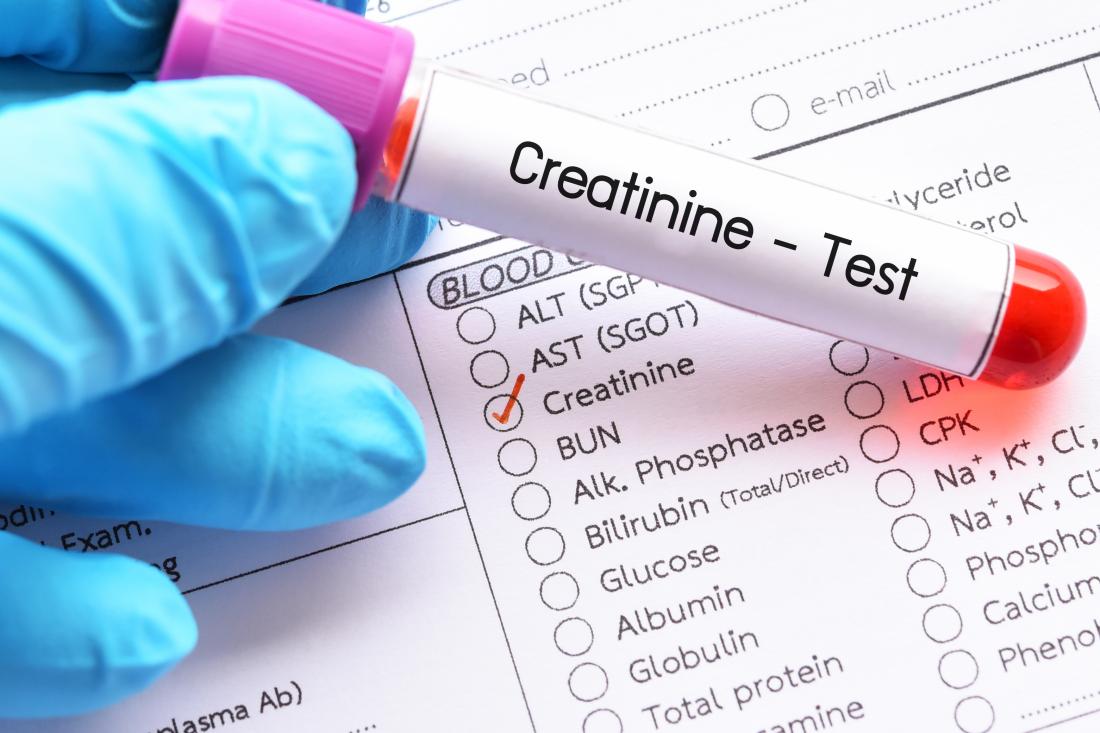Biopsy For Kidney Disease
A biopsy means that a small piece of tissue is taken for testing in a laboratory. Biopsies used in the investigation of kidney disease may include:
- kidney biopsy the doctor inserts a special needle into the back, under local anaesthesia, to obtain a small sample of kidney tissue. A kidney biopsy can confirm a diagnosis of chronic kidney disease.
- bladder biopsy the doctor inserts a thin tube into the bladder via the urethra. This allows the doctor to view the inside of the bladder and check for abnormalities. This procedure is called a cystoscopy. The doctor may take a biopsy of bladder tissue for examination in a laboratory.
Your doctor may arrange other tests, depending on the suspected cause of your kidney disorder.
How Is A Creatinine Test Done
There are two main ways doctors use creatinine tests to measure kidney function:
-
Urine tests. Creatinine clearance can be pinpointed by measuring the amount of creatinine in a sample of pee collected over 24 hours. For this method, you store all your urine in a plastic jug for one day and then bring it in for testing. This method is inconvenient, but it may be necessary to diagnose some kidney conditions.
-
Blood tests.Doctors can estimate GFR using a single blood level of creatinine, which they enter into a formula. Different formulas take into account your age, sex, and sometimes weight and ethnicity. The higher the blood creatinine level, the lower the estimated GFR and creatinine clearance.
For practical reasons, the blood test method for GFR is used far more often than the 24-hour urine collection test for creatinine clearance. But urine collections may still be useful in people who have large muscle mass or a marked decrease in muscle mass.
Why Kidney Function Tests Are Performed
Kidney function tests are performed for a variety of reasons, including something as simple as a yearly checkup, or a urinary tract infection is suspected. They may also be performed if an individual is ill and a diagnosis has not been made, as a screening test for a patient planning or recovering from surgery, or as a way to track kidney disease. Urinary tract infections are common after surgery, and some patients experience kidney dysfunction after a procedure, so these tests are frequently performed on patients recovering from surgery.
Kidney function tests are a reliable way of testing the kidneys, but it is important to remember that they can also change dramatically with illness or dehydration. Many individuals can have an acute problem with the kidneys that resolves after receiving fluids or other treatment.
Also Check: Can Seltzer Water Cause Kidney Stones
Can Kidney Disease Be Prevented
Seeing your healthcare provider on a regular basis throughout your life is a good start for preventing kidney disease. About one in every three people in the United States is at risk for kidney disease. Identify and manage any risk factors for developing kidney disease.
- Control your high blood pressure. Normal blood pressure is 120/80.
- Control your blood sugar if you have diabetes.
- Eat a healthy diet. Follow a low-fat, low-salt diet.
- Dont smoke.
What If My Test Results Show Early Kidney Disease

If a test shows irregular results, your healthcare provider will follow up with you about treatment options. You may receive medications to control blood pressure. Or you may follow up with a nephrologist .
If your test results are atypical, your provider will likely order more frequent kidney function tests in the future. Regular testing helps your provider track your health and any underlying conditions.
A note from Cleveland Clinic
Kidney function tests check how well your kidneys are working. Healthy kidneys assist with removing waste from your body. Conditions such as diabetes or high blood pressure can affect your kidney function. You may also need a kidney function test to diagnose or rule out an infection. Kidney function tests include blood tests or urine tests. Typically, your provider gives you your results the same day or within a few days.
Last reviewed by a Cleveland Clinic medical professional on 07/14/2021.
References
Don’t Miss: Va Rating For Stage 3 Kidney Disease
The Water Hydration Technique
You know how most of us generally go for long periods without water, become thirsty and scull the next available glass in about 30 seconds? Have you ever thought what this does to your body? No? I dont blame you.
The actual fact of the matter is that every time you a drink a glass of water in a hurry, you are placing pressure on kidney function. How? Well, seeing as one of the functions of the kidneys is to keep the fluid levels in the blood stream balanced, by drinking a full glass of water at once you are essentially dumping a large amount of water into the blood stream, which the kidneys now need to balance out . By drinking slowly, a mouthful at a time, you reduce the pressure on the kidneys and increase hydration. Sound too simple to do any good? Good. Now try it.
When Is A Kidney Function Test Done
A kidney function test may be requested as a routine blood test to find out about your general health. It is also requested for a variety of other more specific situations, eg:
- to assess if you have any sign of acute or chronic kidney disease
- to assess for dehydration
- to check how your kidneys are functioning before and after starting certain medicines.
Chronic kidney disease is common as you get older. It has no warning signs until too late. Therefore a kidney function test at various stages can be helpful to find problems sooner. Read more about chronic kidney disease.
Also Check: Can Chocolate Cause Kidney Stones
Managing Kidney Disease In Dogs And Cats
The goal of treatment in kidney disease cases is to reduce the workload of the functional kidney tissue. When the disease is diagnosed earlier, there will be a larger percentage of functioning nephrons available to maintain overall health. Initially, pain medications, intravenous fluids, and anti-nausea drugs may be used to stabilize the animals condition. Bacterial infections can be treated with antibiotics, while stones/blockages can be treated with surgery and dietary changes. In severe cases, kidney dialysis or kidney transplant may be indicated.
Once stabilized, kidney damage can be controlled through dietary changes to reduce the amount of protein filtering through the nephrons, allowing them to work better. Depending on the severity of the damage, animals with this condition will have different prognoses. If caught early enough, animals may stabilize and the kidneys may compensate well enough to only require dietary modification and routine monitoring. If the disease has progressed, animals may require periodic fluid therapy along with medications as needed to control symptoms. Diets for kidney disease patients are generally low in protein, sodium, and phosphorus are enhanced with high-quality protein and carbohydrate sources and enriched with antioxidants and fatty acids.
References
Hall JA, Yerramilli M, Obare M, Yerramilli M, Melendez LD, Jewel DE. Relationship between lean body mass and serum renal biomarkers in healthy dogs. J Vet Intern Med 2015 29:808-814.
Are There Stages Of Chronic Kidney Disease
Yes, there are five stages of kidney disease. The stages are based on how well your kidneys are able to do their job to filter out waste and extra fluid from your blood. The stages range from very mild to kidney failure . Healthcare providers determine the stage of your kidney function according to the glomerular filtration rate . Your GFR is a number based on the amount of creatinine, a waste product, found in your blood, along with other factors including your age, race and gender.
| Stages of Chronic Kidney Disease |
|---|
| Stage |
The treatment choices for kidney failure include:
- dialysis
- kidney transplantation
- non-dialysis supportive care.
Dialysis or kidney transplantation is needed when there is less than 10 per cent of kidney function left. These options are also known as renal replacement therapy . Some people choose non-dialysis supportive care rather than dialysis or kidney transplantation.
Recommended Reading: Can You Have 4 Kidneys
Diabetes And Kidney Disease
About 20 to 30 per cent of people with diabetes develop a type of kidney disease called diabetic nephropathy. This is a serious disease and may worsen other diabetic complications such as nerve and eye damage, as well as increasing the risk of cardiovascular disease.
Diabetic nephropathy is the main cause of kidney failure .
Normal Kidney Function And The Gfr
All the blood in your body flows through your kidneys hundreds of times each day. The kidneys push the liquid part of blood through tiny filters called nephrons and then reabsorb most of the fluid back into the blood. Fluid and waste products that the kidneys don’t reabsorb are sent out of your body in your urine.
The rate of blood flow through your kidneys is the GFR. Your doctor canât measure the GFR itself, so that’s where creatinine and creatinine clearance come in.
Read Also: Is Aleve Ok For Kidneys
What Is A Kidney Function Blood Test
The kidney function blood test measures the level of creatinine, urea and certain dissolved salts.
- Creatinine is a waste product in your body that is made by your muscles. It passes into your bloodstream, and is usually passed out in urine . A high blood level of creatinine indicates that your kidneys may not be working properly.
- Urea is produced when protein is broken down by your body. Healthy kidneys eliminate more than 90% of the urea your body produces. A high blood level of urea may indicate that you are dehydrated or that your kidneys may not be working properly.
- Dissolved salts that are routinely measured are sodium, potassium, chloride and bicarbonate. They are sometimes referred to as electrolytes. Abnormal blood levels of any of these may sometimes be due to a kidney problem.
- eGFR stands for estimated glomerular filtration rate. Although the level of creatinine in your blood is a useful guide to kidney function, the eGFR is a more accurate measure of how well your kidneys are filtering your blood. Using your blood creatinine, and your age and sex, your eGFR can be calculated by computer and reported with the creatinine blood test.
Additional Tests For Kidney Disease

If blood and urine tests indicate reduced kidney function, your doctor may recommend additional tests to help identify the cause of the problem.
Renal Imaging
Methods of renal imaging include ultrasound, computed tomography , and magnetic resonance imaging . These tools are most helpful in finding unusual growths or blockages to the flow of urine.
Renal Biopsy
Your doctor may want to see a tiny piece of your kidney tissue under a microscope. To obtain this tissue sample, the doctor will perform a renal biopsya hospital procedure in which the doctor inserts a needle through your skin and into the kidney. The needle retrieves a strand of tissue about 1/2 to 3/4 of an inch long. For the procedure, you will lie on your stomach on a table and receive local anesthetic to numb the skin. The sample tissue will help the doctor identify the cause and severity of your kidney disease.
Contact
You May Like: Is Grape Juice Good For Kidney Stones
You May Like: Grapes Kidney Stones
Kidney Biopsy To Check For Damage And Disease
A biopsy is a test involves removing a small sample of kidney tissue small through a thin needle to check for damage and signs of certain diseases. The tissue is examined under a microscope to determine the exact cause of the kidney disease, and the biopsy findings may also help us determine the best treatment for your kidney disease.
Prevention & Treatment Of Kidney Disease
Kidney disease is closely linked to high blood sugar, high blood pressure and smoking. The best way to prevent or delay kidney damage is to:
- keep your blood sugar and blood pressure at target
- avoid smoking
- take your medications as prescribed
- have your blood cholesterol checked annually and keep it at target
- follow a healthy meal plan
- exercise regularly
- talk to your doctor about getting screened
If you’ve already been diagnosed with kidney damage or kidney disease, you may need to limit certain foods to prevent waste products building up in your body. Your health-care team may suggest you limit protein foods or foods high in potassium, phosphate or sodium. Controlling your blood pressure is also very important. You should see a registered dietitian for diet advice that is right for you.
In advanced or “end-stage” kidney disease, dialysis may be needed to do the job of the kidneys.
You May Like: Can Kidney Stones Cause Constipation Or Diarrhea
What Is Being Tested
A renal panel is a group of tests that may be performed together to evaluate kidney function. The tests measure levels of various substances, including several minerals, electrolytes, proteins, and glucose , in the blood to determine the current health of your kidneys.
The kidneys are a pair of bean-shaped organs located at the bottom of the ribcage to the right and left of the spine. They are part of the urinary tract and perform a few essential roles and functions within the body.
Unknown Reasons Of Low Blood Platelet Count
its called idiopathic thrombocytopenic purpura.thrombo- means related to platelets, -cytopenia means lack of cells, purpura means a rash of purple spots on the skin caused by internal bleeding due to lack of platelets.Low platelets count by unknown reasons is the commonest in children.If you have a blood infection with some BacteriaBacteria inside the blood will kill platelets and cause low platelets in blood test, persons used to eat raw or undercooked meat are prune to such bacteria-caused low platelets.Escherichia coli is the commonest bacteria causing low blood platelets.Recommendations: Platelets count test, Stool examination, Urine examination, and Anaerobic blood culture.A woman has a blood clot will use up a large numbers of platelets and decrease them in testsThrombotic thrombocytopenic purpura is the meidcal term for low blood platelets count after forming large clots in the body, whereas the term thrombotic means by clotsHigh prothrombintest or elevated D-dimer test can predict the blood clots
Dont Miss: Fluid Backup In Kidneys
Don’t Miss: Is Red Wine Bad For Kidney Stones
What Is Kidney Transplantation
Kidney transplantation involves placing a healthy kidney into your body where it can perform all of the functions that a failing kidney cant. Kidneys for transplantation come from two sources: living donors and deceased donors. Living donors are usually immediate family members or sometimes spouses. This is possible because a person can live well with one healthy kidney.
Also Check: How Much Money Is A Kidney Worth
What Does The Kidney Do
Your kidneys main function is to filter waste products out of your bloodstream. As blood is circulated through the kidneys, waste substances are extracted and then excreted into the urine, which then passes out of the body. Besides being a filter, your kidneys also:
- Regulate your bodys water balance by excreting excess water via urine
- Maintaining the acid/alkaline balance of the body
Donât Miss: Is Metamucil Safe For Kidneys
Also Check: Fluid Buildup Around Kidney
Why Are Comprehensive Metabolic Panels Done
A CMP is done to learn information about the levels of:
- Glucose, a type of sugar used by the body for energy. High glucose levels may point to diabetes.
- Electrolytes:
- Calcium, which plays an important role in how muscles and nerves work.
- Sodium, potassium, carbon dioxide, and chloride, which help control the body’s fluid levels and its acid-base balance. Normal levels of these electrolytes help keep cells in the body working as they should.
Stage 5gfr Of 15 Ml/min Or Less

Patients at Stage 5 have chronic CKD. They have a GFR of 15 mL/min or less and have End Stage Renal Disease .The kidneys have lost almost all ability to function effectively at this stage. They will need dialysis or a kidney transplant to live.
Our kidney specialists can work with you to provide individualized evaluation and treatment, taking into consideration your GFR and other factors. To learn more or schedule an appointment at one of our clinics call 412-802-3043 or toll free 1-800-533-UPMC .
You should discuss this result with your kidney specialist.
Don’t Miss: Is Red Wine Good For Kidney Stones